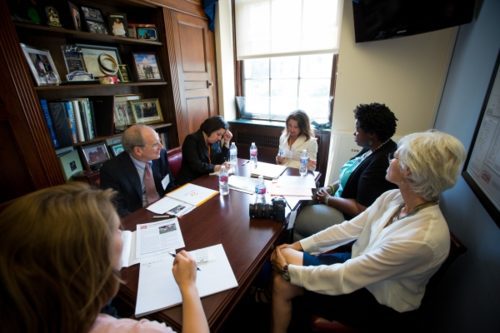By Stephen Padre
Last week, in one of the Supreme Court’s major announcements, the highest court in the land affirmed the power of words. The Supreme Court’s decision on the Affordable Care Act was based on the interpretation of just four words (established by the state) among the millions of words in thousands of pages of legislation. Whether you agree with the Supreme Court’s decision or not, there’s no denying the huge deal the case became for the court, the Obama administration, the health care industry, and for millions of Americans who are covered under Obamacare.
Words also matter in advocacy. We live in a country that generally does not take political action with our bodies. Except for extraordinary times, political change does not happen in the U.S. through widespread strikes, rioting, or violence, as it does in some other countries. Of course, one or thousands of us are allowed to show up in front of the White House, but usually protesters are trying to get the president’s attention with words—with a sign or by shouting in a bullhorn.
Our democracy is built on the exchange of ideas. We exchange those ideas through words—discussion, debate, broadcasting through the media, etc. One of the best aspects of our democracy is the power of the individual, the right of a citizen to speak up and be heard by our government. It’s the power of the words and ideas that the individual is allowed to bring before the government—one of, by, and for the people. And Bread for the World is built on the idea of individuals using their words to speak to their government and to work with it. Motivated by their faith and supported by Bread, people are encouraged to use their own words to influence the decisions that are made for their fellow Americans and for others around the world.
Earlier this month, Bread hosted its annual Lobby Day in Washington, D.C. People from across the country came to visit the offices of their representative and senators on Capitol Hill and advocate for child nutrition legislation. Most of these types of visits last only 10 or 15 minutes – not much when you consider it. But many of these visits and the few words they convey are powerful. A short story told in an in-person congressional visit can hold a lot of weight. And just a few lines in a piece of legislation can mean millions of dollars are put toward a critical anti-hunger program.
Words in Washington have power. The words from politicians and decision makers have power. But so do yours as a citizen or resident of the United States. Claim your power. Speak up. Advocate with Bread. As we saw last week, the whole government might be moved by just a few words.
The United States is one of the wealthiest countries in the world, but nearly 16 million children are food-insecure. Act now! Call (800/826-3688) or email your U.S. representative and your U.S. senators to close the hunger gap today.
Stephen Padre is the managing editor at Bread for the World.
Photo: Participants in Bread’s 2015 Lobby Day from Alabama meet with their member of Congress. Zach Blum for Bread for the World



